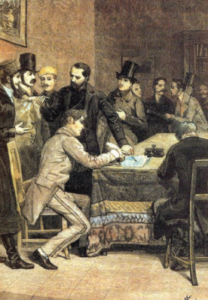The NCERT Solution For Class 10 History Chapter 1 – “The Rise of Nationalism in Europe” provide detailed and insightful answers to all questions in the chapter. This chapter discusses the rise of nationalism in Europe during the 19th century and how it played a crucial role in the formation of nation-states. Key topics covered include the French Revolution, the spread of nationalist ideas, the unification movements in Italy and Germany, and the impact of Napoleon’s rule.
NCERT Solution For Class 10 History Chapter 1 – The Rise of Nationalism in Europe

NCERT Solution For Class 10 History Chapter 1
Write in Brief
- Write a Note on:

a) Giuseppe Mazzini:
- He belonged to the Carbonari secret society and was an Italian revolutionary born in Genoa in 1807.
•Due to his attempts at a revolution in Liguria, he was banished in 1831.
• He founded societies in Marseilles called “Young Italy” and Berne called “Young Europe.”The members were quite young and of similar minds; they came from Poland, Italy, France, and the German states.
b) Count Camilo de Cavour:
- He was a chief minister in the Piedmont state of Sardinia;
- He spearheaded the movement to bring religious unity to Italy; and • His French was far superior to his Italian.
• He and France established diplomatic ties.
It enabled Sardinia-Piedmont to defeat Austria in 1859, resulting in the liberation of northern Italy.
c) The Greek War of Independence:
Greek revolutionaries fought the Ottoman Empire in a successful independence war from 1821 to 1829, with assistance from West European nations.
•Many poets and artists praised Greece.
The Treaty of Constantinople, which was signed in 1832, acknowledged Greece’s independence.
d) The Frankfurt Parliament:
Held its first meeting in Frankfurt’s St. Paul Church on May 18, the All-German National Assembly was composed of middle-class professionals, businesspeople, and artisans from various regions.The German nation benefited from having a parliament-run monarchy under the leadership of this assembly.
On May 31, 1849, it was dissolved due to opposition from the aristocracy and military.
e) The role of women in nationalist struggles:
- The liberal movement disagreed with the idea of granting women political rights.
• Women established a newspaper under the auspices of their political organisation.
• During Assembly election days, women were not allowed to vote.Women could stand in the visitor’s gallery and were considered observers.
NCERT Solution For Class 10 History Chapter 1
- What steps did the French revolutionaries take to create a sense of collective identity among the French people?
Ans: The key actions that French revolutionaries took to help the French people form an identity are listed below:
• The concepts of la patrie (the fatherland) and le citoyen (the citizen) refer to the idea of a single, united society where each state has equal rights under the constitution.
• The royal standard was replaced by a tricolour French flag.
• The Estate General was reorganised and given a new name: the National Assembly. Voters elect this National Assembly.
• New vows, songs, and martyrs were honoured for the country.
•A centralised government created a single set of laws for the entire country.
NCERT Solution For Class 10 History Chapter 1
- Who were Marianne and Germania? What was the importance of the way in which they were portrayed?
Ans: The female allegories of the French and German cultures were Marianne and Germania, respectively. The significance of their portrayal can be found in the following:
• They supported concepts like “the republic” and “liberty.”
• Symbolic meaning that the public could relate to would give them a sense of unity within the country.
NCERT Solution For Class 10 History Chapter 1
- Briefly trace the process of German unification.
Ans:
The following factors contributed to the unification of Germany:
- German middle class nationalist sentiments existed in the 1800s.
• They came together in 1848 to form a nation-state out of several German states.
Prussia was the leader of the movement for German unification; the military and the monarchy worked together to repress them in order to gain their support.Otto von Bismarck was backed by the Prussian army and bureaucracy as prime minister.
•The unification process was accomplished when Prussia triumphed in wars against Austria, France, and Denmark.
In a ceremony held at Versailles in January 1871, William I, the king of Prussia, was crowned German Emperor.
NCERT Solution For Class 10 History Chapter 1
- What changes did Napoleon introduce to make the administrative system more efficient in the territories ruled by him?
Ans:
Napoleon made the following modifications to the administrative structure in order to increase efficiency: • In 1804, a civil code—also known as the Napoleonic code—was established. It abolished the feudal system, freed peasants from serfdom, and established equality and the right to property prior to the passage of legislation.
Towns were freed from the Guild system. There was an improvement in transportation and communication.
Peasants, businesspeople, artisans, and other labourers all benefited from the newfound freedom.
NCERT Solution For Class 10 History Chapter 1
Discuss
- Explain what is meant by the 1848 revolution of the liberals. What were the political social and economic ideas supported by the liberals?
Ans: Liberals during the 1848 revolution described national moments as being backed by the middle class educated people and revolted by the European working class starving and jobless. An uprising occurred in France in 1848 as a result of a severe food shortage and unemployment. Individuals from diverse European regions united in their advocacy for the establishment of a nation-state founded on parliamentary principles.
Liberals back a number of ideas, including:
I. Politically, the call for a constitution along with the unification of nationalism, a constitution, and parliamentary governance.
II. They sought to eliminate birthright and class-based social inequalities.
From an economic standpoint, they desired ownership rights. elimination of the limitations on capital and goods movements.
NCERT Solution For Class 10 History Chapter 1
- Choose three examples to show the contribution of culture to the growth of nationalism in Europe.
Ans:
The following three instances demonstrate how culture has influenced the rise of nationalism in Europe: • Romanticism was a European cultural movement that sought to strengthen national identity.by fostering a sense of shared history, heritage, and emotion.The emphasis was on the emotions, intuition, and mystical feelings that influence and convey nationalist sentiments.Greeks were struggling to forge a national identity, so European poets and artists began advocating nationalism in their support.
The popularisation of nationalism in Europe was greatly aided by folk songs, poetry, and dances. creating a national consciousness through the recording and gathering of various folk cultures. Nationalism is spread by regular people to a variety of audiences.
The development of nationalist sentiment in Europe was greatly influenced by language. For instance, Poland made significant efforts to resist Russian occupation during that time. School-based Polish instruction was discontinued, and Russian instruction was mandated everywhere. Polish citizens began employing language as a tool of national resistance following their defeat in 1831. Mass language use is employed to support the dissemination of nationalist ideas about unity.
NCERT Solution For Class 10 History Chapter 1
- Though a focus on any two countries, explain how nations developed over the 19th century.
Ans: The nineteenth century saw the following developments in the states of Germany and Italy: • Political fragmentation: By the middle of the century, modern-day Germany and Italy were split up into distinct kingdoms and regions, each under the control of a different princely house.
• Revolutionary uprising: The European continent of the 19th century was marked by both mass and middle class, educated liberal uprisings. In 1848, the German National Assembly was established by the middle class of the various German regions. Revolutionaries like Giuseppe Mazzini established the unitary Italian Republic in the Italian region in the 1830s. In 1831 and 1848, the revolutionaries were unable to bring Italy together.
army-assisted unification: The army and aristocracy assisted in the unification of Germany and Italy following the failure of the revolution. 1871 saw the proclamation of the German. Otto von Bismark brought Germany together with the help of the Prussian military and bureaucracy.
NCERT Solution For Class 10 History Chapter 1
- How was the history of nationalism in Britain unlike the rest of Europe?
Ans: The following highlights how British nationalism has differed from that of other European nations throughout its history:
• The abrupt revolution did not lead to the establishment of a nation-state in Britain.English, Welsh, Scots, or Irish people made up the majority of the population living in the British Isles.
• The Union Act of 1707, which united Scotl
and and England, established the “United Kingdom of Great Britain,” signifying that England would now exert influence over Scotland. The political institutions and culture of Scotland were suppressed.
• Speaking Gaelic and dressing in traditional Scottish garb were forbidden to the Scottish people.
England aided the Protestants in Ireland in establishing their dominance over the Catholic nation; the British Flag, national anthem, and language served as the promoted symbols of the new Britain.
NCERT Solution For Class 10 History Chapter 1
- Why did nationalist tensions emerge in the Balkans?
Ans: The following are the Balkan areas where nationalist tensions have emerged:
• As romantic nationalism gained traction, tensions with it surfaced in the Balkans. This region was formerly ruled by the Ottoman Empire.
• In the Balkans, several Salvic communities started to fight for independence.
Because they were envious of one another, they desired more territory, and the imperial power in the Balkans exacerbated the situation.
Russia, Germany, Austria-Hungary, and England all desired greater authority in this field.
• This war precipitated the outbreak of World War I in 1914.
NCERT Solution For Class 10 History Chapter 1
For the Next Chapter Solution Click Below
CHAPTER 1 – The Rise of Nationalism in Europe
CHAPTER 2 – The Nationalist Movement in Indo-China
CHAPTER 3 – Nationalism In India
CHAPTER 4 – The Making of a Global World
CHAPTER 5 – The Age of Industrialisation
CHAPTER 6 – Work, Life and Leisure
For more updates, you can follow us on our social media

